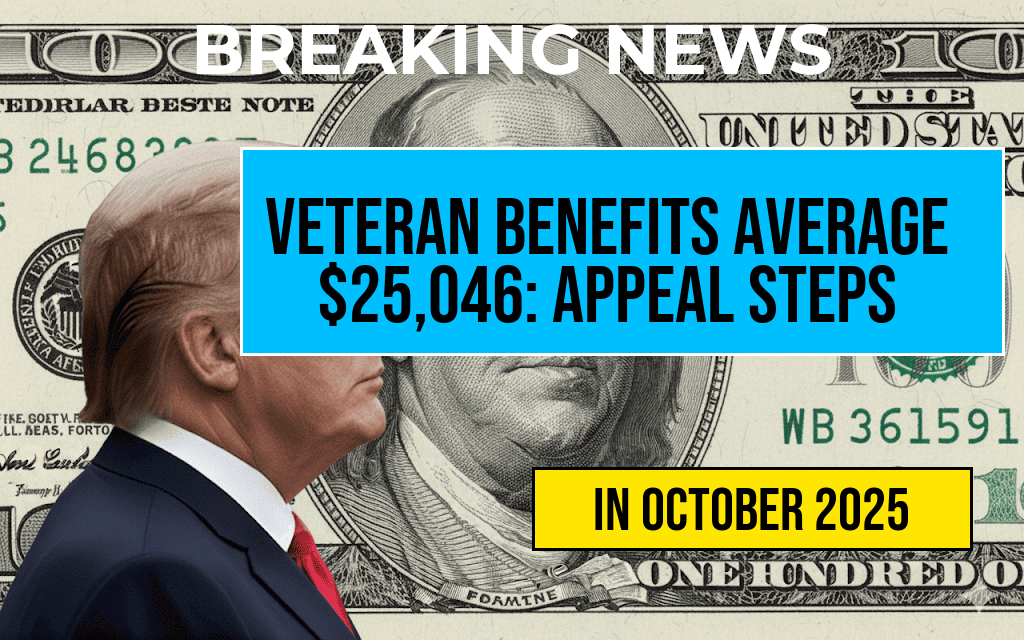The average veteran benefits in the United States have reached approximately $25,046 annually, according to recent reports from the U.S. Department of Veterans Affairs (VA). This figure reflects a combination of various benefits, including disability compensation, pension payments, and educational assistance. While this amount may seem adequate for some, many veterans find themselves earning less than this threshold, prompting concerns about financial stability. For those veterans earning below $25,000, the VA provides avenues for appealing their benefits to ensure they receive the support they deserve. Understanding the steps involved in the appeal process is crucial for veterans who may be struggling to make ends meet.
Understanding Veteran Benefits
Veteran benefits encompass a wide range of programs designed to support former military personnel and their families. These benefits can include:
- Disability Compensation: Monthly payments for veterans with service-connected disabilities.
- Pension Benefits: Financial support for low-income veterans and their survivors.
- Educational Assistance: Funding for veterans pursuing higher education or vocational training.
- Healthcare Services: Access to medical care through VA facilities.
Financial Challenges Faced by Veterans
Despite the benefits available, many veterans experience financial hardships. The VA’s FAQ page indicates that a significant number of veterans receive less than the average benefits, which can lead to difficulties in covering basic living expenses. Factors contributing to this situation include:
- Inconsistent employment opportunities.
- Inadequate understanding of available benefits.
- Delayed processing times for claims and appeals.
Steps to Appeal for Higher Benefits
Veterans who find themselves earning below $25,000 may consider appealing their benefits. Here are the steps to navigate the appeal process effectively:
1. Gather Documentation
Before initiating an appeal, veterans should collect all relevant documentation, including:
- Medical records supporting disability claims.
- Financial statements detailing income and expenses.
- Previous correspondence with the VA regarding benefits.
2. Submit a Notice of Disagreement (NOD)
To formally begin the appeal process, veterans must submit a Notice of Disagreement. This document should clearly state the reasons for the appeal and any supporting evidence. The NOD can be submitted online, via mail, or through a local VA office.
3. Request a Hearing
Veterans have the right to request a hearing before a Veterans Law Judge. This step allows individuals to present their case in person, providing an opportunity to clarify any issues and answer questions directly.
4. Wait for a Decision
Once the appeal is submitted, veterans must wait for a decision from the Board of Veterans’ Appeals. This process can take several months, depending on the complexity of the case and the current backlog of appeals.
Resources for Assistance
Veterans seeking guidance through the appeal process can access a variety of resources. Some helpful organizations include:
- Veterans of Foreign Wars (VFW): Offers support and advocacy for veterans.
- The American Legion: Provides assistance with claims and benefits.
- U.S. Department of Veterans Affairs: The official source for veteran benefits and services.
Conclusion
With an increasing average of veteran benefits reaching $25,046, it is crucial for veterans earning below this threshold to understand their rights and the appeal process available to them. By following the outlined steps and utilizing available resources, veterans can advocate for the benefits they deserve, helping to alleviate financial burdens and improve their quality of life.
Frequently Asked Questions
What are the average veteran benefits currently?
The average veteran benefits have reached $25,046, providing crucial support for many veterans.
What should I do if I am earning below $25,000?
If you are earning below $25,000, you may want to consider appealing your veteran benefits to ensure you receive the assistance you need.
What are the steps to appeal for veteran benefits?
The steps to appeal include gathering necessary documentation, filling out the appropriate forms, and submitting your appeal to the Veterans Affairs office.
Can I receive additional support if my income is below the average?
Who can help me with the appeal process?
You can seek assistance from veteran service organizations, legal aid, or a representative who specializes in the appeal process for veteran benefits.





